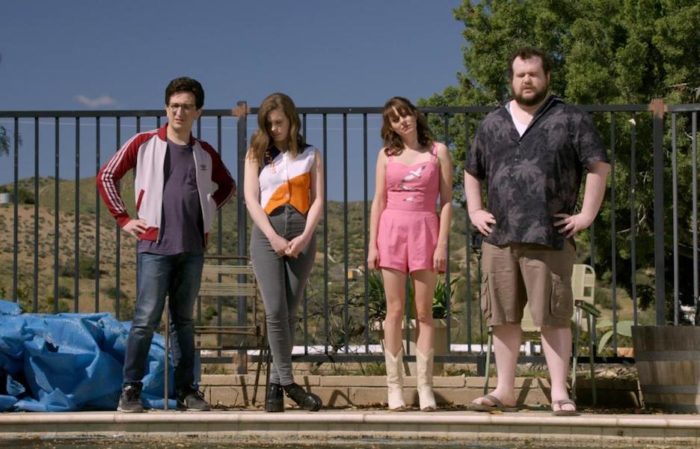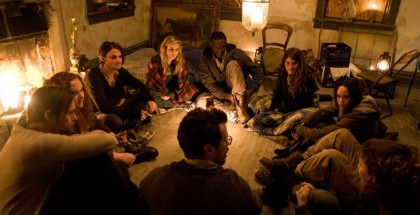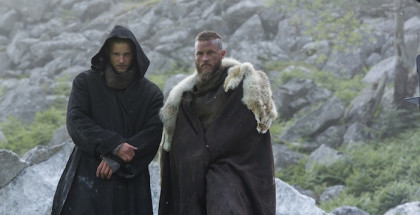Netflix UK TV review: Love Season 3
David Farnor | On 02, Apr 2018
A romantic comedy in which neither of the leads are likeable? That was the basis of Netflix’s Love, created by Judd Apatow, Lesley Arfin and Paul Rust. It made for a surprisingly different series, one that wooed viewers with its unabashedly spiky humour and unflinching approach to its characters’ flaws. Season 2 saw some of that shine wear off, as the fun and novelty faded but the awkwardness remained intact – a victim of Apatow’s typically slow and indulgent approach. It’s only fitting, then, that the show’s third and final run should turn that bulky, sluggish pacing into its strength, as the series wraps things up in a way that’s worthy of its characters and cast.
Season 3 picks up where Season 2 left off, with our couple in love and happily deciding to turn their will-they-won’t-they relationship into a definite “they will”. Mickey (Gillian Jacobs) is sober, open about her addictions to sex, love and alcohol, while Gus (Paul Rust) is managing to support her, and her radio career, even as he starts to reach for his own dreams too. A large part of this season, then, follows each one on their own terms – the kind of diversion that felt like padding in Season 2, but now pays off because it gives both Jacobs and Rust to fill out their parts into even more rounded characters.
Rust continues to hone his put-upon nice-guy schtick with a cloying believability, inserting himself into any writers’ conversation he can on the set of kids’ TV show Witchita – and, later, shouting at his friends, as they agree to help him out in making a film that he’s written. Jacobs, meanwhile, remains superb as Mickey, whose renewed self-confidence and rising radio success is threatened by the ever-present “Dr. Greg” Colter (Brett Gelman). The sight of them colliding fully on-air is a spectacle to treasure, as he bares his petty bitterness with an amusingly ugly intensity.
With added screen-time comes not only more fleshed-out leads, but also more opportunity to explore the supporting cast, and Love’s ensemble has gotten better with every season. With Gus and Mickey essentially on good terms, romance-wise, the show’s MVP, Bertie Bauer (the hysterical Claudio O’Doherty) really gets a chance to shine, as her love life takes centre stage.
That initially takes the form of awkward hanger-on Randy (a brilliantly downbeat Mike Mitchell), who increasingly sponges off Bertie and her roommate – a romantic disappointment wonderfully summed up by his offer of a holiday home getaway to the four of them in the cringe-inducing opening episode. But come Episode 5, when Bertie is essentially the lead, a solo birthday outing leads her to start a new relationship with Chris Czajkowski (Chris Witaske), Gus’ friend, who works in a restaurant and can get her free cake. Witaske and O’Doherty have an utterly charming chemistry together, as each proves as insecure as the other – something that’s at odds with Chris’ well-built physique. Over the course of the season, we find out he wants to be a stuntman, a subplot that sounds random but ends up one of the most satisfying journeys of the whole programme.
Equally surprising is the development of Arya (Iris Apatow), who has gone from a bit-part comedy figure to a subtle character study of a teen star in the media industry. Under pressure on the set of Witchita, she gets her own romantic dilemma to contend with, something that young Apatow performs with an endearing sincerity. As for Greg, it’s only moments before his on-air ranting that we see him off-air at a failed book signing, a moment that’s played with a vulnerability that’s almost sympathetic, except for the fact that he’s so loathsome.
It’s the strength of this cast that gives Love’s third season its compelling backbone, making its 12 episodes a much smoother watch than its sophomore outing. It subtly builds the framework for these final episodes, as the series returns with renewed passion to its theme of what people are really like beneath the surface that others project. Expanding that subversive streak from its central couple to everyone in their lives, Season 3 gives us the chance to meet Gus’ family properly, as he and Mickey head to his South Dakota hometown for a wedding. That paves the way for one last revelation about Gus, as we get a bombshell about his past, one that rings true as much as it shocks.
At the same time, the introduction of Sarah, an old flame, still finds new ways to mine awkwardness out of relationships past and present, giving us fresh insight into Gus’ anxieties and penchant for self-sabotage. The result doubles down on the show’s evolution from a will-they-won’t-they comedy into a can-they-can’t-they drama, as the question remains whether Mickey and Gus are able to accept each other, baggage, warts and all. After giving them the chance to spend so much time apart, Season 3 of Love demonstrates how much better they are together, as each manages to help improve the other’s flaws. After 34 episodes of this realistic, often cynical take on romance, it’s hard to see Love wrapping their tale up with a conventional happy ending, so it’s only right that the show should conclude on a relatively open-ended, yet optimistic, note; the series could conceivably keep going for another 34 episodes and never get any closer to a tidy resolution. Sometimes, as Bertie proves, it’s best to call time and move on.
Season 1 to 3 of Love are available on Netflix UK, as part of an £9.99 monthly subscription.





















